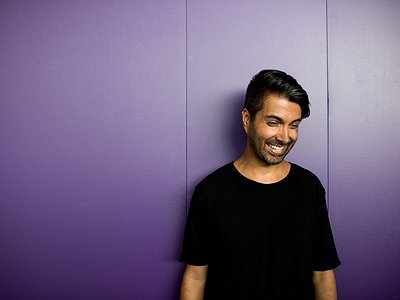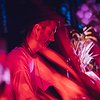Name: Matthew Dekay
Nationality: Dutch
Occupation: DJ, Producer
Current Release: Watch out for Matthew Dekay's Spellbound (featuring a remix by Mandar), coming soon via Mandar's Oscillat label.
Recommendations: My recommendation for music is today is, Life – A Journey Through Time by Phillip Glass.
And my second recommendation is a series of paintings by the artist, Teresita Fernández’s called “Small American Fires“
Website / Contact: If you enjoyed this interview with Matthew Dekay, keep up with his work on Facebook, Resident Advisor and Soundcloud.
When did you start DJing - and what or who were your early passions and influences? What what is about music and/or sound that drew you to it?
I started making music before playing music. I honestly never even considered becoming a DJ because I was a really shy guy. I did collect vinyl records in the 90’s but this was more as a reference to the music I wanted to make. They were records ranging from artists like Future sound of London to the early Hooj Choons records label from the UK. I was really into the UK sound at that time. My first gig was in the summer of 2002, where my manager who was running a label at the time called “Deep Records” asked me if I would be interested in playing some records at the door entrance of a Dutch festival called “Dance Valley”. I decided to do this because it was a very low-key thing and I imagined that nobody would really be paying attention other than being excited and happy to enter the festival. It was personally one of my favourite festivals in Holland so nonetheless it was a big deal for me as I hardly could mix two records together. I somehow ended up on the mainstage of the festival just having a look backstage followed by few minutes later being asked to be the replacement DJ for Chicago house legend “Bad Boy Bill” who couldn’t make it to the festival because he missed his flight. Funny because my first gig was for 50.000 people. Talk about being at the right place at the right time! That was really the defining moment where everything changed for me. I am not sure how I finished that set as it was a complete blur and I basically wasn’t a very good DJ but I learned the craft by playing for people when bookings started to come in after this show. It took me a little while before I fell in love with DJing later on in my career. My heroes at the time were DJ’s like Danny Howells and Sasha.
For most artists, originality is first preceded by a phase of learning and, often, emulating others. What was this like for you? How would you describe your own development as an artist and the transition towards your own voice? What is the the relationship between copying, learning and your own creativity?
On the development side as a DJ I think emulating people if it’s their stage presents or mixing techniques is a great way to build confidence and to create a sense of comfort or familiarity of being on stage in front of people. I think it’s a great tool to be less self-conscious. I think my first phase was really about overcoming my fears of standing in front of a crowd. The second phase for me was to focus on the craft of mixing or “story telling”. My interest was and still is till this day to seamlessly mix records together where you can’t tell where the records start or end and either actually being mixed together. For some this is maybe boring but for me this is the most exciting thing as it’s a lot more challenging in my opinion.
Perhaps I’m my worst critic but it wasn’t until I would say 2012 where I felt that I was finally coming into my own voice. In the years 2009/2010 (before All Day I Dream) Lee Burridge had a massive influence on me as a DJ. When I heard him and Craig Richards as the duo “Tyrant” that was the moment I really started to develop an affection for the craft of DJ-ing. Before that I never really rated a DJ to be really honest with you. I was also kind of on the opposite side of the DJ spectrum as Lee and Craig, so for me it was a new, fresh approach.
What were some of the main challenges and goals when starting out as a DJ and how have they changed over time? What is it about DJing, compared to, say, producing your own music, that makes it interesting for you?
I think the goal for me as DJ was to first overcome my fears. But over time the challenge or goal has shifted as I continued to develop. I believe that it’s important that when you really care about any creative craft, in this case either producing music or DJ-ing, you have to accept that the process is never ending. Today I feel faced with a new set of challenges because doing the same thing over and over again I simply get bored. It’s like playing a video game that you first try to master and then when you finally do and win every time it becomes boring.
I realized recently that to play with the same conviction as when I started DJ-ing you have to not be afraid of being out of your comfort zone again. I think the goal is to never be comfortable. If you get too comfortable it’s where real creativity stops. What keeps it interesting for me is to be able to decide to be uncomfortable again and commit. This counts for DJ-ing but for producing your own music, too.
How would you define the job and describe the influence of the DJ? How are the experience and the music transformed through your work? I didn’t understand the second question but perhaps we can delete this?
I think this is hard to answer because this is highly personal as there is no real definition of what it means to be a DJ. For some it’s just enough to make people dance. For others it’s about joining an existing culture to feel some sense of belonging, and then you have the visionary artist type of DJs who find importance in shaping or creating new culture through their own musical taste/vision. I think ultimately, you’re free to choose a path.
What was your first set-up as DJ like? How and for what reasons has your set-up evolved over the years and what are currently some of the most important pieces of gear for you?
My first setup was just simply two technics turntables as there were no CDJs yet. But I came up in the time where these CDJs just started to pop up here and there in clubs and gave rise to the next generation of DJ’s, “the producer DJ’s” who had the advantage to play their own music out first. We take that for granted now but there was a time where it was almost impossible to play your own music unless you were rich and pressed your own music on vinyl lacquers. At some point I was interested in playing music with Traktor on a laptop but quickly didn’t see reason to continue this as the CDJs have become so powerful that you don’t need to bring a laptop on stage to do the same thing. I currently use 4 CDJs and bring some pedals sometimes with me too. I do really use the 4 CDJs at all times. It’s rare that you see less than 3 faders up on the mixer. I recently started bringing in a reverb by OTO called Bam. You can create ambient like drones with this. I love it!
How do you make use of technology? In terms of the feedback mechanism between technology and creativity, what do humans excel at, what do machines excel at?
One thing humans excel at that technology doesn’t have (yet haha) is intuition. I think it is the most powerful skill a DJ can possess and far more important than getting two records in sync.
My rule with technology is that it should simply serve creativity and can’t get in the way. I am personally not a fan of gimmicky things just for the sake of it. There are probably a ton of examples what machines excel at but I can’t think of any at the moment other than state the obvious like, finding music in your crates vs. usb stick.



